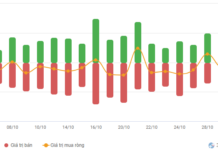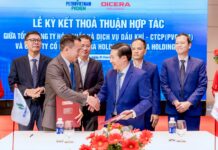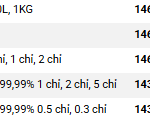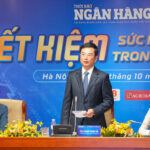Significant opportunities come with challenges for the domestic automobile manufacturing industry
According to the General Statistics Office (Ministry of Finance), in the first five months of 2025, domestic automobile manufacturers and assemblers are estimated to have produced a total of 147,300 units, up 77% compared to the same period in 2024. Meanwhile, about 80,045 cars were imported into Vietnam, with an estimated value of 1.83 billion USD, up 43.3% in volume and 47.7% in value compared to the same period last year.
With strategic economic development goals, the domestic automobile industry plays a significant role in promoting the development of science and technology and serving as an important link connecting the market, infrastructure, and transportation, thereby boosting economic growth. Promoting domestic automobile production also contributes to increasing competition and leveraging the export of automobiles to the world market, enhancing international economic integration. These are also key tasks emphasized by the Politburo in Resolution 57-NQ/TW on international integration in the new situation and Resolution 68-NQ/TW on developing the private economy.
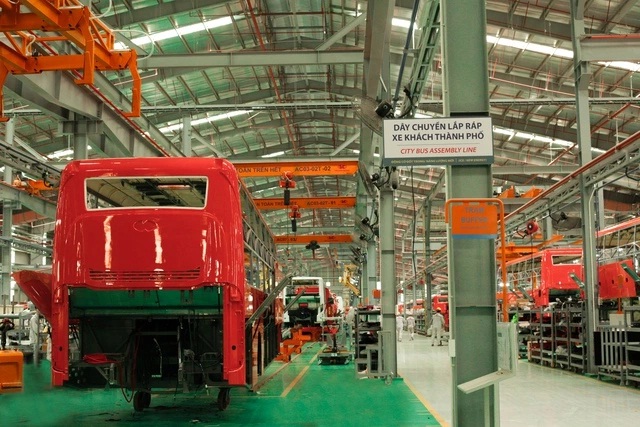
The domestic automobile industry is driving the connection of infrastructure, transportation, and markets, promoting technological advancement, enhancing competitiveness, and fostering international integration.
|
Currently, Vietnam has participated in and signed 17 free trade agreements, including those directly related to the automobile industry such as the ASEAN Trade in Goods Agreement (ATIGA) and the Free Trade Agreement between the EU and Vietnam (EVFTA)…
Accordingly, completely built-up cars imported into Vietnam from ASEAN member countries with a localization rate of over 40% will be exempt from import tax until 2027. As per the EVFTA roadmap, import taxes on cars from the EU will gradually decrease by an average of 6.4% per year over ten years, implying that the cost of imported cars from the EU will decrease, posing significant pressure on domestic automobile manufacturers. Additionally, the tariff agreement with the US in the coming time is also an unpredictable variable.
Not to mention, apart from import tax reduction, car companies worldwide have also launched numerous promotional programs, creating a trend of price reduction with a tendency to spread.
This situation requires domestic enterprises to utilize capital efficiently, increase investment in research and development, improve technology, and enhance production efficiency, thereby increasing competitiveness. The common challenges in the industry are presenting significant problems and tightening the handshake between the ecosystem, including parts suppliers, domestic production and assembly workshops, and output distributors.
The supportive role of credit institutions
As the financial lifeblood, channeling capital to economic sectors and accompanying customers, the credit packages offered by the banking system are highly significant in “opening doors” for the domestic automobile industry, tightening the connection between businesses, and balancing and creating leverage to boost the supply and demand of domestically produced, assembled, and consumed automobiles, aiming to promote exports.
With a deep understanding of customers and anticipating the needs of enterprises, Saigon-Hanoi Commercial Joint Stock Bank (SHB) promptly launched a credit package to support the supply chain of Kim Long Motor, serving as a pillar for the domestic automobile industry. The package offers up to 90% of the capital demand with a maximum loan term of nine months. The flexible collateral for the loan is the right to claim debt/receivables from Kim Long Motor. SHB’s financial solution enables suppliers and units in the supply chain to access capital without mortgaging fixed assets while ensuring capital accessibility and flexibility in operation and cash flow, suitable for their specific characteristics.
 SHB launches a credit package to support Kim Long Motor’s supply chain, financing up to 90% of capital needs with flexible collateral requirements.
|
At the same time, to boost output consumption, SHB also implements an excellent loan program for enterprises wishing to purchase Kim Long Motor vehicles, offering competitive market policies and streamlined procedures. The bank finances up to 85% of the vehicle’s value, with a maximum loan term of 72 months, mortgaged by the purchased asset. With flexible loan terms and a high financing ratio, SHB is committed to accompanying enterprises in investing in vehicles for business and transportation, making the process more convenient and accessible.
SHB’s solution contributes to creating a seamless supply chain, enhancing connections, and promoting the growth of the core enterprise’s ecosystem. With preferential capital access from the bank and improved input-output connections, domestic automobile businesses can confidently develop and gain advantages in the market race.
SHB’s timely accompanying solutions demonstrate its market and customer understanding and affirm its position as one of the Top 10 most reputable private joint-stock commercial banks and one of the Top 5 largest joint-stock commercial banks in Vietnam. With its leading position, SHB is a top bank providing efficient capital for key sectors of the economy and pioneering in offering digital financial solutions for many administrative units and individuals.
The bank focuses its resources on implementing a comprehensive and robust Transformation Strategy based on four pillars: reforming mechanisms, policies, regulations, and processes; considering people as the subject; putting customers and the market at the center; and modernizing information technology and digital transformation.
SHB aims to become the TOP 1 bank in terms of efficiency, the most favored Digital Bank, the Best Retail Bank, and the TOP bank providing capital, financial products, and services to strategic private and state-owned enterprises with supply chains, value chains, and ecosystems, promoting green development.
– 09:39 10/09/2025
Unlocking Capital: How Banks Can Empower Businesses With Access to Finance.
In an era where the private sector is thriving, banks are increasingly vital in providing capital to businesses.
“7 Creative Strategies to Raise $7 Billion for Ho Chi Minh City’s International Financial Center”
I can also offer some suggestions for subheadings if you wish, to further enhance the article’s appeal and provide a clear structure for readers.
The bustling city of Ho Chi Minh is set to invest a substantial sum of 7 billion USD in the development of an International Financial Center. This ambitious project aims to establish the city as a prominent financial hub, not just in Vietnam but also on a global scale. With this significant investment, the city plans to create a thriving ecosystem that attracts international businesses and investors, fostering economic growth and cementing its position as a leading financial destination.
“The $100 Aircraft-Grade Fastener Conundrum: Why Vietnam’s Manufacturing Sector is Yet to Take Off.”
“Vietnam’s current focus on manufacturing neglects the crucial need to invest in infrastructure and technology. Without a shift in focus, we risk remaining confined to low-end segments and missing out on global supply chains. A telling example is the country’s inability to produce a $100 bolt used in commercial aircraft wheels, highlighting the urgent need for a strategic rethink to elevate our position in the global market.”
Unlocking New Opportunities for Investors: The Transformative Impact of Key Infrastructure Developments in Southern Ho Chi Minh City
According to Ms. Duong Thuy Dung, Executive Director of CBRE Vietnam, investors have recognized the irrationality of real estate prices in the center of Ho Chi Minh City and are strongly shifting their focus to the neighboring areas. These peripheral zones benefit directly from existing and upcoming infrastructure and belt road projects, offering significant growth potential.


